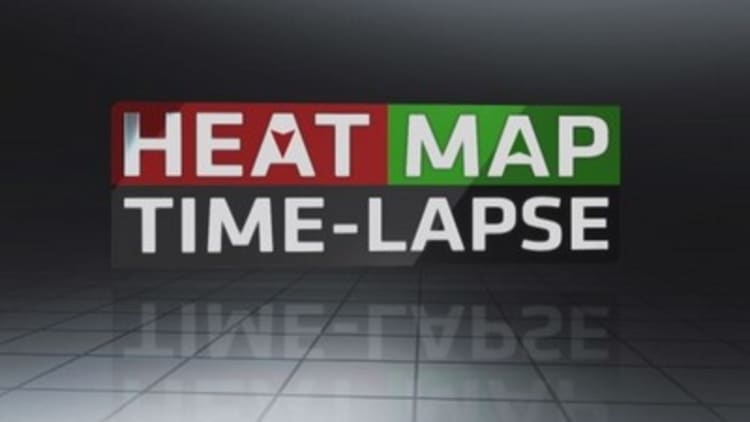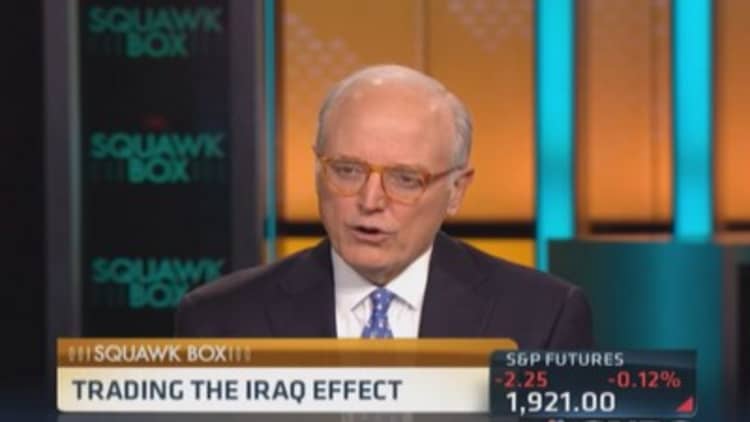
U.S. stocks stepped modestly higher on Friday, with the Dow and S&P 500 tallying their first weekly loss in four, as investors tracked developments in Iraq on concern violence could interrupt global oil supplies.
With militants headed to Baghdad, and likely to be there "in the next couple of days, you go into the weekend with potential fireworks —who knows what the price of oil will be Monday morning," said Peter Boockvar, chief market analyst at The Lindsey Group.
And, Bank of England Governor Mark Carney's comments on Thursday "quickly reminds people two other central banks in the world are tightening. So, after the excitement of the ECB (European Central Bank), we shift back to the Fed next week and Carney's surprising comment," said Boockvar.
In a speech that came a week after the ECB became the first large central bank to adopt negative interest rates, Carney said a rate increase "could happen sooner than the markets currently expect."
The Federal Open Market Committee starts a two-day on Wednesday, with the FOMC expected to reduce its monthly asset purchases by another $10 billion to 35 billion.
On Friday, President Barack Obama said the United States would offer Iraq's government logistical support, but would not be sending American troops back into that country.
"We'll be monitoring the situation very carefully over the next couple of days," Obama told a televised news conference.
"So far we have not seen major disruptions in oil supplies," the president said in response to a reporter's question.
Earlier Friday, U.S. Secretary of State John Kerry said he expects Obama to make "timely decisions" on Iraq, given the gravity of the insurgency in a nation that produces about 3.3 million barrels of crude a day.
"The market got pounded two days in a row and is taking a rest going into the weekend. It's the reverse of the first quarter, where nobody wanted to be long over the weekend. All the bad news is on the table, so maybe investors want to play this one flat. We can pound the market again on Monday," said Jack Ablin, chief investment officer at BMO Private Bank.
Read MoreOil spike fears rise as stability in Iraq unravels
"There is concern that a spike in oil prices already at elevated levels could choke off consumer spending," said Mark Luschini, chief investment strategist at Janney Montgomery Scott.
OpenTable rallied after Priceline Group said it would acquire the online restaurant reservation service for $2.6 billion. Intel climbed after the semiconductor maker hiked its second-quarter revenue outlook. Citigroup fell after Bloomberg cited a person familiar with the matter in reporting the Justice Department had asked the bank for more than $10 billion to settle an investigation into the lender's sale of mortgage-backed bonds ahead of the 2008 financial crisis.
Major U.S. Indexes
After falling 15 points and rise as much as 53, the Dow Jones Industrial Average rose 41.55 points, or 0.3 percent, to 16,775.74, with Intel leading blue-chip gains that cut the Dow's weekly drop to 0.9 percent.
Down 0.7 percent from last Friday, the advanced 6.05 points, or 0.3 percent, to 1,936.16, with energy the best performing of its 10 major sectors.
The Nasdaq climbed 13.02 points, or 0.3 percent, to 4,310.65, down 0.3 percent on the week after four weeks of gains.
For every three shares falling, roughly four rose on the New York Stock Exchange, where 574 million shares traded. Composite volume neared 2.6 billion.
On the New York Mercantile Exchange, crude futures for July delivery rose 38 cents, or 0.4 percent, to settle at $106.91 a barrel; gold added 10 cents to $1,274.10 an ounce.
The dollar gained and the 10-year Treasury yield held at 2.605 percent.

Data Friday showed producer costs dropped in May, casting a benign light on inflation.
Consumer sentiment slipped to 81.2 in June, below expectations.
The reports give the Federal Reserve "a little more wiggle room to not respond with higher rates," said Ablin.
On Thursday, U.S. stocks fell, extending the S&P 500's drop into a third session, as worry about violence in Iraq increased, along with the price of oil.
Read MoreStocks hit by Iraq and oil; S&P 500 off for third day
—By CNBC's Kate Gibson
More From CNBC.com:



